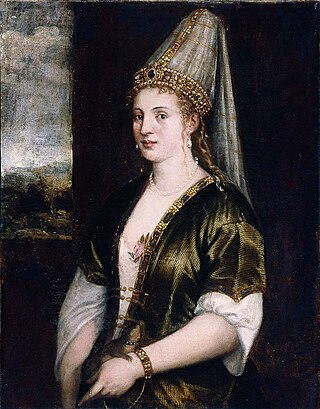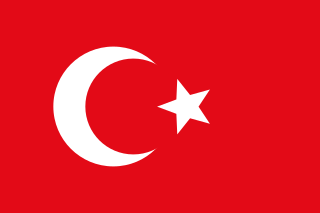List of representatives
Ottoman Empire
Turkish Republic
39°52′03″N32°51′29″E / 39.867444°N 32.857966°E [14] [15] [16] [17] [18]
| Ambassador of Kingdom of the Netherlands to Turkey Embassy of the Netherlands, Ankara | |
|---|---|
| Inaugural holder | Cornelius Haga |
| Formation | 1612 |
The Dutch ambassador in Ankara is the official representative of the Government in The Hague to the Government of Turkey.
39°52′03″N32°51′29″E / 39.867444°N 32.857966°E [14] [15] [16] [17] [18]
The Republic of Turkey was created after the overthrow of Sultan Mehmet VI Vahdettin by Mustafa Kemal Atatürk in 1922 by the new Republican Parliament in 1923. This new regime delivered the coup de grâce to the Ottoman state which had been practically wiped away from the world stage following the First World War.

Mehmed VI Vahideddin, also known as Şahbaba among the Osmanoğlu family, was the last sultan of the Ottoman Empire and the penultimate Ottoman caliph, reigning from 4 July 1918 until 1 November 1922, when the Ottoman sultanate was abolished and replaced by the Republic of Turkey on 29 October 1923.

Mahmud I, known as Mahmud the Hunchback, was the sultan of the Ottoman Empire from 1730 to 1754. He took over the throne after the quelling of the Patrona Halil rebellion. His reign was marked by wars in Persia and conflicts in Europe. He delegated government affairs to his viziers and devoted time to writing poetry. Nader Shah's devastating campaign weakened the Mughal Empire and created the opportunity for Mahmud I to initiate war with cooperation from Muhammad Shah. The alliance ended with the latter's death, leading to tensions between the Afsharids and the Ottomans.

Hürrem Sultan, also known as Roxelana, was the favourite consort and legal wife of the Ottoman Sultan Suleiman the Magnificent. She became one of the most powerful and influential women in Ottoman history as well as a prominent and controversial figure during the era known as the Sultanate of Women.

The Turkish War of Independence was a series of military campaigns and a revolution waged by the Turkish National Movement, after parts of the Ottoman Empire were occupied and partitioned following its defeat in World War I. It resulted in the collapse of the Ottoman Empire, the abolition of the Turkish monarchy and of the Islamic Caliphate, and declaration of the Republic of Turkey in Anatolia and Eastern Thrace. The conflict was between the Turkish Nationalists against Allied and separatist forces over the application of Wilsonian principles in post-war Anatolia and Eastern Thrace. In addition, it resulted in a transfer of vested sovereignty from the sultan-caliph to the nation, setting the stage of Republican Turkey's period of radical reform.

Geuzen was a name assumed by the confederacy of Calvinist Dutch nobles, who from 1566 opposed Spanish rule in the Netherlands. The most successful group of them operated at sea, and so were called Watergeuzen. In the Eighty Years' War, the Capture of Brielle by the Watergeuzen in 1572 provided the first foothold on land for the rebels, who would conquer the northern Netherlands and establish an independent Dutch Republic. They can be considered either as privateers or pirates, depending on the circumstances or motivations.

Musa Kâzım Karabekir was a Turkish general and politician. He was the commander of the Eastern Army of the Ottoman Empire at the end of World War I and served as Speaker of the Grand National Assembly of Turkey before his death.

Ahmed Tevfik Pasha, later Ahmet Tevfik Okday after the Turkish Surname Law of 1934, was an Ottoman statesman of Crimean Tatar origin. He was the last Grand vizier of the Ottoman Empire. He held the office three times, the first in 1909 under Sultan Abdul Hamid II, and from 1918 to 1919 and from 1920 to 1922 under Mehmed VI during the Allied occupation of Istanbul. In addition to his premiership, Ahmet Tevfik was also a diplomat, a member of the Ottoman Senate, and the Minister of Foreign Affairs.

Damat Mehmed Adil Ferid Pasha, known simply as Damat Ferid Pasha, was an Ottoman liberal statesman, who held the office of Grand Vizier, the de facto prime minister of the Ottoman Empire, during two periods under the reign of the last Ottoman Sultan Mehmed VI, the first time between 4 March 1919 and 2 October 1919 and the second time between 5 April 1920 and 21 October 1920. Officially, he was brought to the office a total of five times, since his cabinets were recurrently dismissed under various pressures and he had to present new ones. Because of his involvement in the Treaty of Sèvres, his collaboration with the occupying Allied powers, and his readiness to acknowledge atrocities against the Armenians, he became an unpopular figure in Turkey and emigrated to Europe at the end of the Greco-Turkish War.

The occupation of Istanbul or Constantinople, the capital of the Ottoman Empire, by British, French, Italian, and Greek forces, took place in accordance with the Armistice of Mudros, which ended Ottoman participation in the First World War. The first French troops entered the city on 12 November 1918, followed by British troops the next day. The Italian troops landed in Galata on 7 February 1919.

The Istanbul trials of 1919–1920 were courts-martial of the Ottoman Empire that occurred soon after the Armistice of Mudros, in the aftermath of World War I. The leadership of the Committee of Union and Progress (CUP) and selected former officials were charged with several charges including subversion of the constitution, wartime profiteering, and the massacres of both Armenians and Greeks. The court reached a verdict which sentenced the organizers of the massacres – Talat, Enver, and Cemal – and others to death.

Italy-Turkey relations are the relations between Italy and Turkey. Both countries are members of NATO and the Union for the Mediterranean and have active diplomatic relations. Italy is a member of the European Union, Turkey is not a member. Relations between Turkey and Italy date back centuries in the form of various predecessor states.

South Africa–Turkey relations are the current and historical relations between the Republic of South Africa and the Republic of Turkey. Formal diplomatic relations were established at consular level in 1991 and consulates-general were opened in Istanbul and Johannesburg respectively. Both consulates were closed following the upgrading of relations to ambassadorial level in October 1992. South Africa has an embassy in Ankara. Turkey has an embassy in Pretoria. From 1998, Turkey has maintained a Consulate General in Cape Town with jurisdiction over the Western, Northern and Eastern Cape Provinces. The post is filled by the current incumbent in an honorary capacity, Adv Glenn Babb.
Heath Ward Lowry is the Atatürk Professor of Ottoman and Modern Turkish Studies emeritus at Princeton University and Bahçeşehir University. He is an author of books about the history of the Ottoman Empire and Modern Turkey.

India–Turkey relations, also called Indian-Turkish relations or Indo-Turkish relations are the bilateral relations between India and Turkey. Since the establishment of diplomatic relations between India and Turkey in 1948, political and bilateral relations have been usually characterised by warmth and cordiality, although some sporadic tensions remain due to Turkey's support for Pakistan, India's rival. India has an embassy in Ankara and a consulate–general in Istanbul. Turkey has an embassy in New Delhi and also a consulate-general in Mumbai. As of 2015, the bilateral trade between India and Turkey stood at US$6.26 billion.

The Franco-Ottoman Alliance, also known as the Franco-Turkish Alliance, was an alliance established in 1536 between the King of France Francis I and the Sultan of the Ottoman Empire Suleiman I. The strategic and sometimes tactical alliance was one of the longest-lasting and most important foreign alliances of France, and was particularly influential during the Italian Wars. The Franco-Ottoman military alliance reached its peak around 1553 during the reign of Henry II of France.

The abolition of the Ottoman sultanate by the Grand National Assembly of Turkey on 1 November 1922 ended the Ottoman Empire, which had lasted from c. 1299. On 11 November 1922, at the Conference of Lausanne, the sovereignty of the Grand National Assembly exercised by the Government in Angora over Turkey was recognized. The last sultan, Mehmed VI, departed the Ottoman capital, Constantinople, on 17 November 1922. The legal position was solidified with the signing of the Treaty of Lausanne on 24 July 1923. In March 1924, the Caliphate was abolished, marking the end of Ottoman influence.

The Government of the Grand National Assembly, self-identified as the State of Turkey or Turkey, commonly known as the Ankara Government, or archaically the Angora Government, was the provisional and revolutionary Turkish government based in Ankara during the Turkish War of Independence (1919–1923) and during the final years of the Ottoman Empire. It was led by the Turkish National Movement, as opposed to the crumbling Constantinople Government, which was led by the Ottoman Sultan.
Demetrius Nicolaides, also known as Nikolaidis Efendi, was an Ottoman Greek journalist and compiler of legislation. Johann Strauss, author of A Constitution for a Multilingual Empire: Translations of the Kanun-ı Esasi and Other Official Texts into Minority Languages, wrote that Nicolaides was "an extremely active but somewhat enigmatic figure in the press life of 19th century Istanbul".